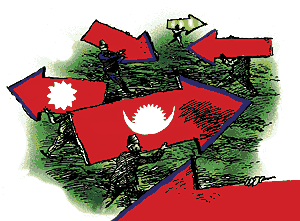 By coincidence, the Indian press was commemorating Indira Gandhi's dreaded "Never Again" Emergency when King Gyanendra arrived in India. Here was a foreign dignitary whose country was also in an internal emergency, visiting during the anniversary.
By coincidence, the Indian press was commemorating Indira Gandhi's dreaded "Never Again" Emergency when King Gyanendra arrived in India. Here was a foreign dignitary whose country was also in an internal emergency, visiting during the anniversary. A lot has changed in the structure of Indian media since the fateful night of 25 June, 1975, but the memory of midnight knocks on the door still makes senior journalists in New Delhi shake their heads.

The glamorous youngsters of corporate India's tabloid TV wouldn't know it, but it was the Emergency that tested the resilience of press freedom in their country. And barring exceptions such as the Indian Express and the Statesman, much of the mainstream press easily succumbed to authoritarian pressure. The tycoon press, symbolised back then by The Times of India and The Hindustan Times, willingly transformed themselves overnight into the mouthpieces of Indira Gandhi's propaganda machine.
The dissenters were all from the margins: stalwarts of the alternative media like Nikhil Chakravarti's Mainstream, Romesh Thapar's Seminar, and Raj Mohan Gandhi's Himmat kept the lamp of freedom flickering during the long night of the Emergency. Lal Krishna Advani once rued that the Indian press shamelessly crawled on all fours when all they were asked to do was bend a bit. It is an irony of history that Advani is today deputy prime minister of a right wing government in New Delhi that is hounding Time's Alex Perry and tehelka.com's Tarun Tejpal.
To be fair, Perry's salacious gossip was unfair, and Tejpal's tehelka often crosses the thresholds of entrapment journalism. But there are more appropriate methods of fighting motivated reporting than serving summons to international columnists on flimsy grounds and raiding the premises of a web publisher under specious pretexts. Especially in a country that likes to call itself the world's largest democracy.
Unfortunately, the authorities do much worse when they have emergency powers at their disposal. Vidya Charan Shukla used to make Indira Gandhi's critics disappear. And here in Nepal, under a "partyless" prime minister, the government seems to be borrowing from Shukla's dreaded emergency handbook. The Krishna Sen episode is an example of the low respect that the authorities have for the personal freedom of those that they perceive to be "enemies".
In this instance, let me say that Krishna Sen was no journalist in the usual sense of the term. The publications that he edited-Janadesh and Janadisha-were Maoist propaganda sheets. That they came out at all was a tribute to the freedoms that our press enjoyed before the emergency. They were not "newspapers" because no attempts were ever made to separate news from views in any of the content. I am not too sure of the literary merit of Krishna Sen's poems either. Sen was a pamphleteer masquerading as a journalist and a litterateur. (Full Disclosure: I was often the target of the editorial witch-hunts in Janadesh for being a consistently vocal critic of the Maoists.)
But that hardly matters. Pamphleteering is no sin in any civilised society, much less a crime in a democracy. In democratic countries, dissenters expect to be heard. However, democracy in Nepal is in a state of suspended animation. Prime Minister Sher Bahadur Deuba obviously doesn't feel the pangs of conscience when he is advised by his security forces to insist that the facts about Krishna Sen will be made public in due course.
There are credible reports in the media that Krishna Sen died in detention. A diplomat in Kathmandu is quoted by the 28 June edition of the London-based daily The Independent as saying: "There is a body and it has marks consistent with torture." This is too serious an allegation to wait for 'an appropriate time' for an official explanation. It is no more the credibility of the prime minister alone that is at stake. Our rule of law itself is now under international scrutiny. Such censure at the international level can severely impair the government's resolve to fight Maoist insurgency with full force.
In a country where the death sentence is constitutionally prohibited, all killings are extra-judicial. Prime Minister Deuba is right: nobody is above the law if he is a terrorist. But he must remember, that the law of the land doesn't permit his agencies to execute anyone either.
What is also at stake now is not just the freedom of the press, as it was for the media in India during Indira Gandhi's emergency. Freedom of opinion and expression were both suspended with the declaration of the state of emergency. The bigger challenge before the Nepali press is to raise a united voice to protect the Right to Freedom enshrined in Clause 12 of Part 3 of the Constitution of Kingdom of Nepal (1990). Sen is just one name; the right to life of every other Nepali is equally sacrosanct. The Maoists are terrorists, so they are not bound by the laws of the land. But if the state doesn't respect the life and dignity of its citizens, its own legitimacy would be in serious jeopardy.



